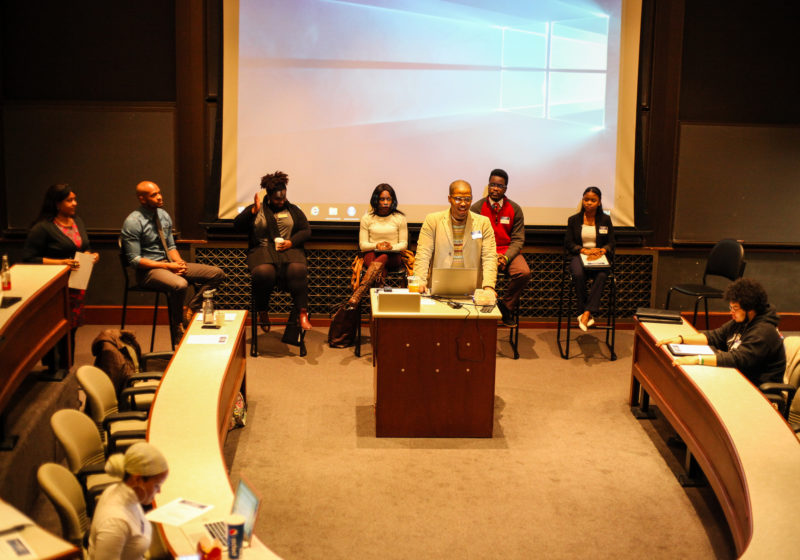Rochester Mayor Lovely Warren proclaimed March 3, 2017 a day to commemorate the Joint Collegiate Black Student Summit (JCBSS)—a gathering of black leaders and students organized by UR students—at the 2017 summit’s opening ceremony this past Friday.
And in talks with event organizers and attendees, the summit seemed a success—in follow-through and in impact on the students it was directed toward.
“The importance of this event is so that black students understand that their black identity is not a burden, it’s a blessing,” Junior and JCBSS Chairwoman Amber Hudson said. “And it’s actually a gift because there are so many things within the black culture that we can celebrate and highlight and use to build up each other.”
Whereas last year’s summit focused on addressing protests and activism at PWIs across the country, this year’s theme, “forward together,” centered on empowering students of color and their communities.
Many raise awareness about issues facing the black community, Hudson said, “but no one’s talking about what we do from there.”
“It’s not enough to just protest,” she said. “We’re going to do something about it now.”
Warren—the first female and second African American mayor of Rochester—said that students demand to be heard “from the president’s office all the way down to the R.A. on the floor,” recalling her own experiences as a student at a PWI and encouraging students to “keep doing what you’re doing.”
Other speakers touched on the importance of effective advocacy, mentorship, and a shared sense of community and identity among people of color.
“It’s important for black individuals to see other black individuals who are successful,” freshman and the summit’s executive director Jamal Holtz said. “They get to see someone the same skin color or came from the same background as them and see that they made it out or they found a way for better opportunities.”
Junior Delvin Moody founded the summit two years ago to create a network for black student unions, as well as a forum to discuss the improvement of college communities. Moody felt that minority organizations, particularly black student groups, experienced isolation at predominantly white institutions (PWIs) like UR.
UR administrators and students also noted the difficulties that can come with being an underrepresented group on campus. Though UR has support systems in place like the Office of Minority Student Affairs and the Kearns Center, not all students know of and use them, and it can feel as though those systems are limited.
Hudson reiterated Moody’s belief that black student can feel isolated at PWIs.
When your community doesn’t have the same resources as those of some peers, and world events seem to say “that people that look like you are not worth anything, that they’re less than, and they’re being killed, and your families are being attacked,” she said, it can affect the way you look at yourself and the world you’ll live in after you graduate.
In Warren’s commemoration, she praised the summit’s organizers and participants for their efforts to strengthen communities and the relationships between black students and college institutions.
At University town halls on race and arming Public Safety officers over the past year, students of color have been vocal about their concerns and their thoughts on the racial climate at UR.
In its inaugural year, 2016, the summit brought together students and speakers from several colleges and universities with an estimated turnout of over 150 attendees. This year, however, JCBSS was a local, one-day event with around 10 to 15 people in attendance at the opening speech and keynote.
Summit organizers plan to partner with other universities every other year, so that the summit will switch off between larger regional events and Rochester-focused ones. The hope is that traveling to other campuses will give attendees the chance to hear different perspectives from different students.
This year’s summit also featured talks by: CEO of LaLew Public Relations Jessica Lewis; President of Rochester Black Bar Association Duwaine Bascoe; panelists Kyvaughn Henry, Simone Johnson, Kevin Graham, and Mariffer Acosta Pizarro; and a keynote speech by Mentoring to Manhood executive director Daon McLarin Johnson.






